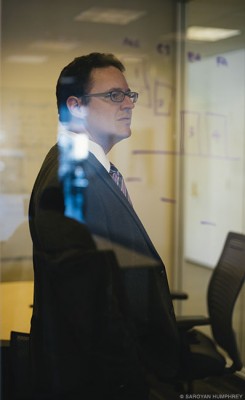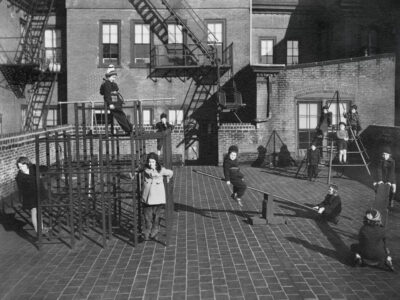
With the Minerva Project, Ben Nelson W’97 is out to “build the world’s greatest university from scratch.” Should Penn—and other top-tier schools—be worried?
BY ALYSON KRUEGER
Illustration by Roman Klonek
Photography by Saroyan Humphrey

Ben Nelson W’97’s profound dissatisfaction with the state of higher education goes back a long way: to his days at Penn, and even before that.
Nelson was born in Haifa, Israel, but grew up in Montclair, New Jersey, where as a teenager he would write papers (for fun!) about ways his school could up its academic game. He read and critiqued plans from the George H. W. Bush Administration for reforming the Department of Education. While his high-school friends were compiling their college wish-lists based on rankings in US News or campus aesthetics and amenities, Nelson was carefully analyzing the curriculum of each of his potential choices. He found Penn’s to be better than those of its elite peers, but he would ultimately conclude that they all were “falling on their faces in their most important responsibility to their students by far.”
It’s an opportune moment for someone interested in reinventing higher education, which has been getting its full share of pointed questions. (Is a college degree still “worth it”? Are “flipped classrooms” and MOOCs—massive open online courses—all they’re cracked up to be?) And the 40-year-old Nelson isn’t just talking about them. He’s the chair and CEO of the Minerva Project (minervaproject.com), which he founded four years ago and which—to hear him tell it, at least—is poised to shove Penn and the rest of its peers off the top of the higher-education heap. It hopes to do so with an undergraduate curriculum that combines traditional rigor with the latest instructional technologies and a global immersion—while charging a much lower tuition (currently $10,000). Like Steve Jobs, Jeff Bezos, and others who shook up the status quo in their respective industries, Nelson is marching ahead without giving much thought to critics or doubters.
“It should only be a matter of time,” he declares, “for the other great institutions to say, ‘It is ridiculous for us to be outdone by a new startup.’”

While other observers are a bit more measured in their assessments, Minerva is widely seen as an exceptionally ambitious disruptor of—and alternative to—the higher education status quo. Of course, it has a long way to go before it can be said to have outdone its competitors, having only admitted its first “founding” class (of 27 students) in September 2014, followed by its current freshman class of 111 (chosen from some 11,000 applicants). But Nelson and the Minerva Project have already attracted some serious, high-profile figures. One is former Harvard president and US Treasury Secretary Lawrence Summers, who chaired its advisory board during its early startup. Another is cognitive neuroscientist Stephen Kosslyn—a former dean of social sciences at Harvard and director of Stanford University’s Center for Advanced Study in Behavioral Neurosciences—who signed on as Minerva’s founding dean. Then there is Bob Kerrey, former president of the New School for Social Research (and previously governor and US senator from Nebraska), who told Nelson: “You’ve solved every problem that is plaguing American higher education, and it’s too good for it not to work.”
Kerrey is now executive director of the Minerva Institute of Research and Scholarship, one of the three component parts of the Minerva Project. The other two are the Minerva Schools at KGI (Keck Graduate Institute, the California-based institution through which Minerva’s undergraduate program is accredited) and the Minerva Academy, described on its website as a “distinguished society of educators” and “an honorary institution and forum for open exchange of new ideas and enhanced practices in higher education instruction.” Housed within the Minerva Institute, the Academy is currently headed by Nobel laureate Roger Kornberg, and awards the $500,000 Minerva Prize for “extraordinary advancements in teaching innovation, excellence and impact.” (The first winner, announced in May 2014, was Harvard physicist Eric Mazur.)
In addition to the prominent academic figures mentioned above, Nelson has garnered some serious support from investors. Benchmark Capital, for example, has provided $25 million in seed money, the largest such investment by the Silicon Valley venture capital firm behind Twitter, Uber, Snapchat, Dropbox, and Instagram.
He has also generated some outsized media attention for his brainchild. A 2013 Wall Street Journal profile, headlined “The Man Who Would Overthrow Harvard,” asked: “Can the Minerva Project do to Ivy League universities what Amazon did to Borders?” The Atlantic’s feature last September continued the theme with this teaser: “The Future of College? A brash tech entrepreneur thinks he can reinvent higher education by stripping it down to its essence, eliminating lectures and tenure along with football games, ivy-covered buildings, and research libraries. What if he’s right?”
It’s going to take some time to find out. First Minerva has to graduate a few classes, and see if those students can get jobs. Then the school has to be able to scale up and grow while holding on to its strict principles and values. And media attention notwithstanding, it also has to build name recognition in the higher-education world. Many people I spoke to had never heard of Minerva.
The Minerva Schools consist of five colleges: social sciences, natural sciences, computational sciences, arts and humanities, and business. Students spend their time mastering lifelong skills rather than subjects. Freshmen master 115 “habits of the mind,” such as making logical arguments or measuring the probability of a claim, while upperclassmen learn to think critically about their disciplines.
Classes, which are all seminar-style with 20 students or fewer, are held online, and professors have access to special technology that helps them keep students engaged. Because the classrooms are virtual, Minerva doesn’t have a campus. Instead, students spend their first year in San Francisco and in subsequent semesters will rotate among six major world cities: Buenos Aires and Berlin in year two, followed by Bangalore, Seoul, Istanbul, and London for years three and four.
The lack of infrastructure helps cut down on costs—tuition is currently $10,000—and the varied locations are designed to give students exposure to global cultures, people, and ideas. (Just how much of that they need is another matter, since the 111 students who enrolled this year hail from 30 different countries.) Students do have to pay for housing, in “centrally located residence halls” that facilitate “exploration of each urban locale”; fees there run about the same as for other undergraduates in those cities, Nelson says.
“By exploring each new place together, you form lasting friendships and a collective identity,” the website promises. (The educational philosophy may be revolutionary, but the marketing copy hits some traditional notes.)
Minerva’s model also could end up eliminating one of the great stressors of college admissions. While traditional top-tier schools must turn away many more qualified applicants than they accept, Minerva doesn’t have to cap its student body and plans to admit every student who meets its criteria.
“One of the most distinguishing features between Minerva and other universities is the absence of a quota in our admissions process,” says admissions director Neagheen Homaifar. “As a result, we don’t have to deal with any political jockeying or negotiations that may go into choosing between two great candidates. If both meet our standards, both are admitted.”
Furthermore, according to the school’s website, 58 percent “of admitted students matriculate—a higher rate than most of the Ivy League.”
“This is a living, breathing program,” says Kosslyn, “and it is very much changing and evolving as time goes on.”
Given the challenges facing humanity these days, and the polarization and bureaucratic inertia that often stymies progress, the need for a highly evolved and responsive system of higher education is urgent.
“When you look at innovation and leadership, and you think about the great men and women of the past, I find it hard to look around and think of the greats today,” Nelson says. “I’m not saying universities are fully to blame, but they do have an element of that responsibility.”

If Nelson does succeed in overthrowing the system, in a certain sense, Penn will have sown the seeds of its own downfall. It was here that he sketched in the outline of what would become the Minerva Project, during a class at the University and with the help of Penn professors.
As a freshman in 1993-94, Nelson, a Benjamin Franklin Scholar, took a yearlong class jointly taught by Ira Harkavy C’70 Gr’79, director of the Netter Center for Community Partnerships, and history professor Lee Benson. In those days, students spent one semester learning about the history of the University, and the other on how to re-think current institutions.
Harkavy remembers Nelson as an “exceptionally good student, very engaged in undergraduate reform efforts,” with a “strong interest in how to improve undergraduate education.” They’ve also spoken recently about the Minerva Project and the ways that the course influenced Nelson’s thinking. While Harkavy tends to be skeptical both about the extent that technology can replace face-to-face learning and the need for the kind of “external disruption” that Minerva represents for improving higher education, he adds that he “couldn’t think more highly” of Nelson himself.
“He’s bright, he’s passionate, he’s driven by values and ideas,” he says. “I’m thrilled to see his engagement and involvement in these issues.”
Nelson says he learned that at one time, universities had strict curricula with required courses for all students, which enabled them to learn the skills necessary to join the job force of the future. Since the 1970s, the model shifted toward giving students the freedom to choose their classes, even when fulfilling requirements, which meant that many students focused their ingenuity on avoiding challenging but critical subjects—statistics, say, or writing, depending on the student—rather than conquering them.
By the time Nelson was a sophomore, he was already agitating for an academic revolution. His critique was simple. While colleges and universities talked a good game about educating future leaders, the schools were really only teaching content. Students learned a little about a lot of topics in history, in biology, in the arts. But they weren’t learning fundamental skills like thinking critically, dissecting complex problems, and working with others—the skills that would help them solve big problems in the future.
Colleges and universities “were set up to take the tiniest slivers of society, the students with the highest potential, and get them ready to run the joint,” he says. “They exist to get us prepared to make decisions of consequence. And it wasn’t right that Penn and other schools are doing nothing about it.”
With the help of class assignments and his professors, Nelson created a core curriculum that focused on teaching students to think critically, analyze data, deal with complexity, and communicate effectively. He joined the Student Committee on Undergraduate Education (SCUE), eventually serving as chair, and lobbied President Judith Rodin CW’66 Hon’04, Provost Stanley Chodorow, deans, and other high-ranking administrators to adopt his ideas.
While he did manage to launch a few Benjamin Franklin Scholar classes that taught his principles, and helped establish the preceptorial program in which students take interesting mini-classes for fun (i.e., non-credit), he admits he couldn’t make any meaningful change stick.
“I had the most powerful student voice on campus,” he says. “I was in every committee meeting; I was in the academic and budgetary meeting; I was literally voting on budgets. If I couldn’t do anything from that position, [I thought], ‘This is hopeless, there is nothing that could be done.’”
Nelson eventually gave up on reforming Penn, but held fast to his ideas about changing higher education. He did some consulting, then spent a decade at the online photo-printing and sharing site Snapfish. Joining the company in 1999, he was named president in 2005, and that year managed its sale to Hewlett-Packard for a reported $300 million. (He says his take from the company’s 2005 sale was not a major windfall, though it was “enough to put a down payment on a house.”) He stayed with Snapfish until 2011, and his feelings about his experience there are mixed.
“It was my finishing school,” he says. “But it was also a decade of my life that I spent selling widgets, and at the end of the day, if I wasn’t selling those widgets, somebody else would have.”
And so he decided to focus on something he’d always been passionate about: creating the kind of school he always wanted to attend—and, in the process, transforming higher education. His elevator pitch: “I’m going to build the world’s greatest university from scratch.”
Most people thought he was crazy. “It’s not fit to print what version of crazy they thought I was,” he says, but after a year a few pieces fell into place. Summers offered to chair the future school’s advisory board, an offer that left Nelson “flabbergasted,” he says. “I didn’t even have an advisory board, I had nothing!”
Summers is no longer associated with Minerva, but his involvement boosted the project’s credibility, prompting other players to jump on board. Venture capitalist Greg Mauro says he believes the project will open access to higher education.
“There has been no significant increase in supply in Ivy League schooling capacity, while the cost has skyrocketed and the rigor varies considerably,” he says. “Minerva is going to democratize access on a merit basis to the global middle class.”
Some distinguished academics left their teaching posts at established universities to join the experiment. Vicki Chandler, who signed on as dean of Minerva’s College of Natural Sciences, spent 12 years as a professor at the University of Oregon and another 12 at the University of Arizona. She says she was attracted by the opportunity “to develop approaches and tools and technology that could have a broader impact beyond Minerva students.”
The idea of being pioneers was also appealing to students. Haziq Azizi Ahmad Zakir, a 21-year-old from Kuala Lumpur, Malaysia, had his choice of colleges—including Brown, Berkeley, and UCLA—but was drawn to Minerva because it allowed him to be an entrepreneur and shape something new. “I have the opportunity to work with an amazing team to start a university from scratch,” he says. “We really are collaborators and peers in this process, and that’s super empowering.”
For Nelson and Kosslyn, a key text has been former Harvard President Derek Bok’s 2013 Higher Education in America . In the book, Bok lays out three main problems facing higher education. The first is that academic curricula aren’t preparing students for real jobs or life. Students at most universities take three types of classes: electives, courses for their majors, and general requirements like a writing or quantitative-analysis class. The “major” might not make sense—sociology majors don’t usually become sociologists and international-relations majors don’t become diplomats, so why take all those classes in the subject? Electives are also useless for the most part because they end up being on haphazard topics, “usually what teachers like teaching,” says Kosslyn.
That leaves the general-education component. At most schools, this results in students taking classes that are either the most entertaining or the easiest (as in the classic “rocks for jocks”) rather than the most useful for their future. Minerva is trying to take that component, expand it, and make it as beneficial as possible for students.
Kosslyn gives the example of studying homelessness. At a school like Harvard, where he taught for 30 years, most students will never study the subject, he says—or if they do, it will be through a seminar where they read literature on the subject and discuss it. At Minerva all students take a class called complex systems, where they start by analyzing the complexity of societal interactions in a bird flock or ant colony. They then move up to complex human systems that have no leader, where multiple causes account for one event, and where small changes can have huge impacts later on.
“So we train students that you shouldn’t accept when someone says [homelessness is caused by] drug use or mental issues or both,” says Kosslyn. “Everything interacts. Our students understand that and get a sophisticated way of looking at these things.”
A 25-year-old student from outside Tel Aviv who asks to be identified as Roiman says that while he wouldn’t choose to take these classes on his own, “it seems to me very clear what the use of this is. It’s more helpful than studying English poetry.” The other day, he says, a friend told him that marriage is the No. 1 cause of happiness. “What is the methodology?” he responded immediately.
The second issue highlighted in Bok’s book is that students don’t feel they are getting that much out of college. That leads to high drop-out rates—in 2014 the National Student Clearinghouse found that only 55 percent of first-time undergraduates who matriculated in the fall of 2008 had completed a degree in six years—or students simply going through the motions.
Some of this dissatisfaction has to do with the way professors teach, Nelson says.Many still use traditional lectures, a teaching technique that studies have shown to be broadly ineffective compared to “active learning.” Minerva is tackling this issue with its online seminars and the special technology it built to help students engage.
For example, students taking classes on Minerva’s learning platform must hold down the control key on their laptop to speak, and that’s used to track participation as a percentage of total class time. When a student is not participating enough, his or her face will be highlighted for the professor. Other tools allow teachers to run polls, separate students into breakout groups, and put students “on stage” in a virtual setting.
“People think online learning means passive videos that people take instead of learning, but it’s actually the opposite,” says Vicki Chandler. “This way every single student is in the front row. It’s really powerful for active learning.”
Roiman says it works. “You can see everyone,” he says. “You don’t need to raise your hand too high to be noticed or look back to see who is laughing. You always get to talk and hear other opinions … It creates this close relationship with your professor and fellow classmates.”
The third problem plaguing higher education is cost. “The answer for us is simple,” says Kossyln. “Don’t own anything.” Because Minerva doesn’t own buildings and doesn’t fund large research or sports operations, it can charge less than a quarter of what many private institutions do for tuition.
Kelly Professor of English Al Filreis, faculty director of Kelly Writers House and director of the Center for Programs in Contemporary Writing at Penn, has long been fascinated by how technology can be used to engage learners, both traditional college-age students and others. Way back in the 1990s, he was one of the first to use email as a tool for class discussion, and he currently presides over a very popular and uniquely interactive MOOC on modern poetry.
According to Filreis (who is incidentally one of the 14 leading educators elected to the Minerva Academy), Minerva’s price advantage is what really sets it apart.
“Minerva’s methods are not new and certainly the software is not new,” he says. “What’s new is their attempt to do this at a much lower cost, and that is certainly worth exploring.”
That advantage helps Minerva attract a diverse range of applicants. Three-quarters of Minerva’s current students are on financial aid, which means they really couldn’t afford tuition at peer institutions. In addition to student loans, Minerva provides scholarship grants to students who demonstrate significant financial need, funded through donations to the nonprofit Minerva Institute.
Minerva’s admissions process is designed to attract a broader variety of students, with respect to both nationality and income level. While colleges may not make admissions decisions based on family income or ability to pay, the application process by its nature favors wealthier students whose families can afford tutoring for standardized tests and guidance on writing essays. Students applying to Minerva take assessment tests (one portion asks you to look at a series of changing patterns and figure out what comes next) in real-time, in front of a camera, so no outside help can be provided. Rather than a traditional admissions essay, applicants share five accomplishments of which they are proud, even if they regard them as “untraditional.”
The entire application is done online and at no cost, so anyone with a computer connection has a fair shot. (It’s pretty easy to complete, too. I went through the entire process, and it took me about two hours; there were video tutorials explaining each step along the way, eliminating the need for expensive guidance.) “We were, and continue to be, committed to reducing advantages money can buy in the admissions process,” says admissions director Homaifar.
Roiman says the school “naturally screens for people who actually have something they’ve done, something they are interested in,” adding: “Everybody has some kind of skill that amazes us when we discover it.”
Nelson doesn’t pretend that Minerva has come up with anything truly new—in fact, he seems more inclined to fault the powers-that-be for failing to see what’s right in front of them. “The fact of the matter is Minerva could have no right to exist—because we didn’t invent anything,” he says. “All we have done is take what we already know works and implement it.”
Columbia University, for example, has had a core curriculum that even Nelson concedes is not bad. And Penn has been experimenting with teaching models and content for more than two decades. It was one of the first Ivy League schools to encourage its professors to “flip the classroom”—basically having students watch lectures and read assigned material before class, saving the valuable face-to-face time for more effective ways of learning like debates, discussions, and problem solving. The University was also one of the first to partner with the online course providerCoursera and to encourage professors to participate in MOOCs [“MOOC U.,” Mar|Apr 2013].
Amy Bennett, director of course operations for Penn’s online learning team, said these experiments have led to new ways of teaching in the physical classroom. One Wharton professor used a peer-grading system online, found it was better than instructor grading, and implemented it on campus.
“Let’s just say that Penn faculty creating and teaching massive open online courses is way out on the end of the spectrum of pedagogical experimentation,” says Filreis. And Penn is hardly the only university experimenting; Coursera alone currently has 139 educational partners across 28 countries offering 1,490 courses. And it seems like online-only universities pop up every day offering students the opportunity to get degrees at a far lower cost than that of attending a traditional college.
But even as elite institutions experiment, they can’t fully embrace new modes of learning the way Minerva can. While other universities have traditions and legacies and in-fighting among professors and departments, Minerva was built from scratch by a few people according to a clear set of guiding principles about how higher education should ideally function.
“Right now we are top down, we are very principled in a way you can’t do anywhere else,” says Kosslyn. “By the way, we are going to have the politics here. We have faculty now, we have students now, we are dealing with human beings here, but at least we started off being very principled or at least trying to be.”
Bennett says she believes it takes two or three years to see if online programs can scale up enough to survive. While Minerva might be able to sustain a few classes, as it grows, there is a question of whether it can keep its classes and curriculum as true to its guiding principles.
Teaching can be a priority at Minerva because professors don’t have to do research or apply for grants or publish a set amount of writing. Tenure is not even an option, since the Keck Graduate Institute, with which Minerva is affiliated, does not offer it. According to the school, most faculty teach full-time, under renewable contracts that are “written to protect academic freedom.”
“In a more traditional university, teaching is one of many things a faculty member is juggling,” says Chandler. “It’s often not their priority, no matter how good of a teacher and how motivated they are. There is just a finite amount of time they can dedicate a week to it.”
Then there is the reality that other universities—like Penn and the other Ivy League schools—have different missions than Minerva.
“What Minerva is doing is a boutique operation, and it doesn’t have the responsibility other universities have in discovering new ideas and knowledge and curing diseases and all that stuff,” says Filreis. “So there really is only an apple-and-oranges comparison.”
Bennett says that Penn would never want to move away from face-to-face learning on campus; it’s part of its DNA.
“Universities have multiple goals, and many succeed brilliantly at some of them,” Kossyln says. “Many universities aim to provide furniture for the mind, give students a rich understanding of where they came from, and create well-rounded citizens.
“These are worthy goals, but limited,” he says. “We want to do more than this. We can set the stage—and increase the likelihood that people will be able to do something remarkable with their lives.”
Alyson Krueger C’07 writes frequently for the Gazette.





4/26/16
Hi,
Wonderful article about Minerva. I need to know: Is the college a for-profit institution?
I teach in a high school and scholarship money might depend on the answer.
Please respond soon!
Thank you!
Hello Colleen,
Minerva at KGI (the college) itself is not-for-profit. However, the Minerva project is for-profit as it has plans to license out its online platforms.
When I was at Penn, I recall a lecture by Russell Ackoff, another distinguished Penn grad, in which he said that he never understood higher education until he realized that the institutions are about the teachers, not the students. The students are just a by-product. The Minerva Project appears to be a way of turning this situation upside down, at last. I hope it works.
Wow!!!! This was just an amazing idea which really worked and its going to live. I am proud that someone could come with an ideal idea of coming up with a conducive school so that people like me can benefit and equipped with better ideas that will help the world at large.
Bravo!!!